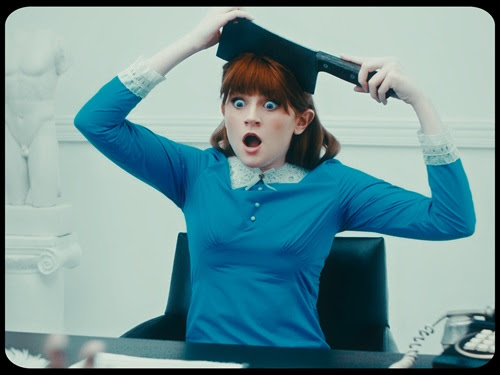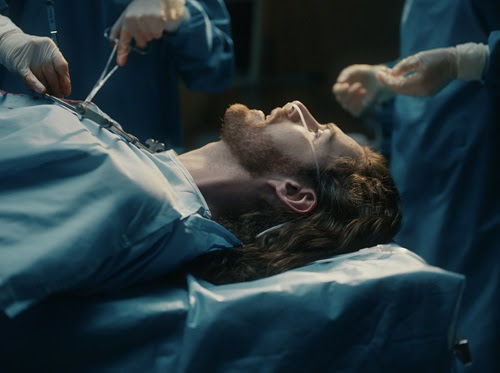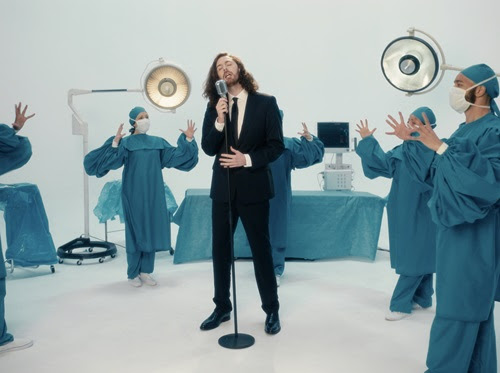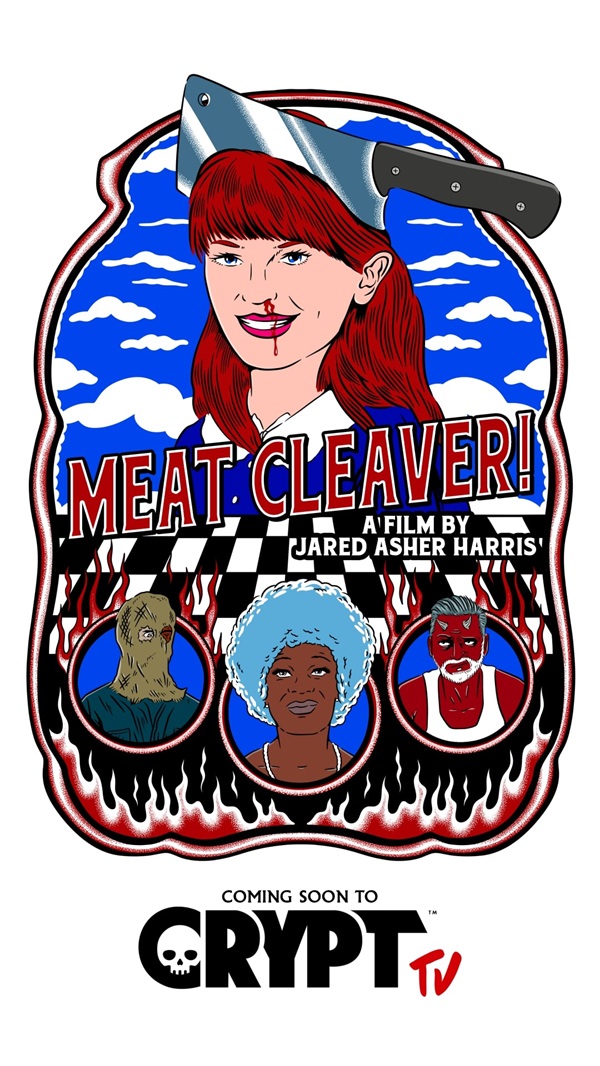By: Valerie Milano and Sarah Key
Los Angeles, CA (The Hollywood Times) 09/19/2024 – In the light of all things dark or traumatic, there is usually something positive that comes out of the experience.
The life of director Jared Asher Harris couldn’t reflect this motto more strongly. Harris’s career involves directing a music video for Hozier titled “All Things End” and more recently directing his first short film MEAT CLEAVER!. A film reflecting the duality between heaven and hell within the characters, the settings, and even the main plot device of the meat cleaver demonstrates the troubles one may face in their life and how to overcome them.
Growing up, Harris always had the dream of becoming a director. He would find creative ways to introduce this field and his creativity to his peers at school, pretending to create films and storylines with them as characters.
“When I was little, I would write scripts and convince parents to drop their kids off early at school (I’m talking elementary school) to rehearse for a movie that would never get made because we were eight years old of course. I was always doing that stuff, but through life’s normal paths and challenges and what have you, I kinda lost a little bit of that, I guess, leader kind of confidence and what not,” Harris said.

The success of MEAT CLEAVER! can be attributed to Harris’ childhood experiences and inspirations he saw on the big screen growing up. Displayed on the wall of his living room hangs a painting of Jack Skellington from Tim Burton’s The Nightmare Before Christmas (1993), one of Harris’ favorite directors to date. Directors Sam Raimi of Evil Dead (1981) and the original Spider-Man trilogy along with Belle Brooks has inspired Harris deeply in his work. The aesthetics come from what he has seen in their films, and thus MEAT CLEAVER! was born.
“I wrote it because I had to…through this process, I’ve come to realize, through the feedback I’ve gotten, that I’m a pretty good writer…I guess it’s all embedded in me growing up or Tim Burton stuff or movie musicals, what have you. In terms of story, I feel it’s very me,” Harris added.
After graduating from school and transitioning into the real world, Harris quickly realized he truly wanted to be a director and gained his confidence back. His first big project was with the iconic singer and songwriter Hozier, after being attached to an email asking for a pitch for a specific movie video. The timing of things couldn’t have been more surreal to Harris.
“I was on the list of people who were asked to pitch something because I made somewhat of a reputation of doing things that are a bit outside of the box. So, the prompt, all the information I got is, ‘We have this song. It’s written like a kind of love song. It comes across like that or a heartbreak song. Andrew Hozier does not want that. We want something different. Have at it.’ And that week coincidentally I learned, the timing was unreal, my grandmother who has now made a full recovery. It was miraculous…was diagnosed with…colon cancer…the contrast of the same week I’m learning about that, learning about my grandmother who is my hero, and so anything I do with a lot of directing, a lot of business involved, I learned a large amount of it from her. I love her, and she was one of the first people to believe in me,” Harris added.
Balancing both devastating news with positive possibilities reflects Harris’ career with contrast, a strong element he uses in MEAT CLEAVER! and in Hozier’s music video “All Things End.” In MEAT CLEAVER! all four characters display a wide array of personalities, all showcasing contrast, a state of being strongly different in comparison to one another.
“Well, one thing I was saying even the other day was that all characters are a little bit of you and it’s kind of fun, I think. I like creating characters, coming up with concepts where there’s very clear distinctive personalities at play. I love in general even just analyzing how people interact with each other…and then we have Wendy who’s anxious and scared…and then in hell, we have the devil who knows what’s happening, direct, saying it, and very irritated like ‘let’s get this show on the road,’ and this other guy who’s bumbling, kind of slow, not really fully understanding what’s happening, not getting the point. I’m into visual contrast…or even to use the dreaded term “juxtaposition.” This beautiful woman with porcelain skin, red hair, a beautiful blue dress, very prim and proper, but then a meat cleaver in the head. There’s just something so…with the clean, marble floor and white walls…that shouldn’t be. And I think that’s from the get-go, even if you have the sound off, you’re like ‘What’s going on here,’ so I think that might be what inspires the characters,” Harris said.

In “All Things End” there are similar concepts and ideas as well, demonstrating Harris’s talents and uniqueness as a director. Even during a time of high anxiety and having thoughts of losing his grandmother, he was composed, presenting brilliant ideas that swayed Hozier himself.
“I was just in whatever headspace, and I wrote this music video where, even though it sounds counterintuitive…kill off the star, you know 30 seconds into the song and for the remaining video is lying there dead. As counterintuitive as that seems, that’s what I pitched. Everything from the black and white to the dancing. I had all the references…I imagined, for some reason…you see these dance performances where people are wearing masks in different cultures and what have you and I thought, ‘Woah. Wait, a medical surgical mask…I feel that’d be a very striking image.’ Even the gospel choir transformation at the end,” Harris said.

Harris added that he loves talking about “All Things End” as it was the most popular artist and team that popped up in his inbox to that point. He added there was such an openness for him to be a part of the project with the team. The most important factor was how Harris stayed authentic and true to himself.

“…It kind of all, I guess, cause of the headspace I was in, came out of me and Hozier and his team, the powers that be, they loved it, and maybe it was because it was very authentic. I think another reason I loved it so much was because it was an idea where I did not censor myself at all and I was most authentically me. So, it was very validating that that idea is the one that got me my biggest video and…that’s why I was inspired. I’m like, you know what? I think I’ve proven to myself I can do this, and I make MEAT CLEAVER!,” Harris said with excitement about his newest project.
Viewers can find themselves inspired and possibly even healed in some light or cathartic sense from Harris’ new film as it showcases an element similar to letting go of a troubled past. Both his film and music video debut a new form of reality under his unique filmmaking techniques related to his experiences growing up.
“With the Hozier video…there was almost this acceptance of this “so is life” in a very kind of solemn way…it’s all part of this experience. In some ways, MEAT CLEAVER! does the same thing in the sense of the character Wendy, who I very much identify with, because…I feel like I was growing up with a meat cleaver in my head and no one was helping me. ‘Hello! What’s going on?’ And everyone’s very calm… ‘Why is there such…? I have…? Hello!’ You know? So, I think that in a different kind of way it sends a similar message by the time you get to the end of the film. There’s a line when stuff goes down, ‘Why did you do all of that?’ and she replies, ‘because I knew you’d be okay.’ In a totally different kind of voice than the Hozier video. A similar message of ‘this is all part of it. It will all be okay.’ It’s two very different ways of making that point but I do think that sort of underlying thought drives a lot of my work,” Harris said.
The theme of “it will all be okay in the end” is such an important saying in storytelling and connecting with an audience and can also be quite cathartic to those who need to hear it. The question is, how did Harris come up with the idea to connect this theme to a meat cleaver in his protagonist’s head, an object that is commonly used in cooking? Harris seized this unheard-of opportunity to not only entertain his audience but also fulfill his goal as a director.
“I’ve always been about the spectacle [vision] through all my life, through work. I want to entertain. That’s the big priority. I’ve learned I have deeper callings as well in terms of how I want people to feel and be emotionally impacted.…With the meat cleaver specifically, I just started writing and messing around with this idea of someone being in a room not knowing where they are and then the line specifically, ‘I don’t know how to tell you this, but there’s a meat cleaver in your head,’ and then I didn’t have the characters fleshed out or where, what, and I just wrote the rest of the film around that line…I kind of liked it. I looked it up. There was no other film that’s called just MEAT CLEAVER so ‘I’ll snag that while I can’ I think it makes people curious especially when they see stills from it and how pretty it is. ‘Meat cleaver? I was not expecting the movie called MEAT CLEAVER! to look so pretty,” Harris said regarding the use of the meat cleaver in the film.
The film uses warm and lite tones to mimic the settings of heaven and hell incredibly well. The contrast of the reds with the whites was Harris’ way of easily differentiating between the two settings without confusion. In all, the film is more than pretty. When picturing heaven one might immediately think of a white aura or aesthetic where hell is red and fiery. Harris followed through with these ideas and decided that one setting was going to be clean while the other was going to be a pigsty.

“I wanted it to feel surreal…there’s actually a comment on Instagram I wanted to post, ugh. I really hope this isn’t A.I.”, and I thought, “Nope. All 100% organic U.S.D.A. filmmaking, but that’s a compliment because I wanted it to feel almost pop-up book-esque. Not to the point where it’s unbelievable. Especially in heaven everything is minimalistic and just “O.C.D.” perfect…I was very particular down to the wainscoting…I was very conscious how everyone’s skin looked, everything being perfect…but in hell, let’s make it a mess. There should be ramen noodles spilled out on the desk. There should be papers everywhere…The contrast between these two settings, totally clean and totally dirty and disgusting. You have Wes Anderson heaven and this grindhouse hell,” Harris shared regarding the creation of the sets in the film.
In using these two vastly different settings for MEAT CLEAVER! Harris wanted to eliminate any confusion other settings may produce if more complex. Not wanting to confuse the audience with what was happening, Harris took to slowing down the dialogue and balancing the settings for an easy distinction on who the characters are and what purpose they serve.

“There’s nothing more instilled in the zeitgeist of humanity than heaven and hell. That immediately eliminates issues, any possible confusion, even though it’s a slow reveal of where you are, what’s happening, what’s good, and what’s bad. That way I had that kind of already squared away and then could focus on…all the weird stuff. It wasn’t because I was dying, no pun intended, to explore heaven and hell,” Harris jokingly added about his choice in settings.
Although it seemed easy to direct and create all the concepts and characters for the film, Harris faced some challenges in the process of completing MEAT CLEAVER! within the writing aspects. It isn’t uncommon for a writer or director to face conflicts within the writing, especially when it comes to length.
“I was always kind of silly or quirky or what have you even just growing up, and it may have been in a very different way, but me being funny has always been a hit or miss…In writing this and wanting to so badly stay true to my sense of humor but at the same time making it something that is funny…I wanted to make sure the humor was still palatable…so really writing down and thinking what is really necessary because this originally was so much longer…and after you cut all of that stuff you start thinking, “What’s even the point of this?”…So figuring out…What do I want to tell? What do I want people to take away?” Harris stated.
In continuing to stay true to himself and his ideas throughout the production, Harris added that he feels that being authentic was the biggest driving force in the pursuit of finishing the film.
“Growing up I felt like I was hiding and ashamed of who I was, and I shouldn’t have been. I was a sweet kid, so it’s a very big thing to me now that I want to be me. I want in my work, not in an abrasive ‘get out of my way’ way but just kind of in a ‘I don’t want to be anyone but myself’…It’s kind of fun to find that voice of what’s going to entertain while still checking out that box of being authentic…When we look at something we can tell…something about it isn’t right and a lot of the time I think it’s because…It was trying to be profound. It was trying really hard to be funny,” Harris said.
Harris has the dream to direct feature length films in the future and especially continue within the genre of horror.
“I love the process. I love working with people, and I love being able to make stuff that’s out there and crazy, but at the same time I have a…blue collar approach to things where it’s very practical…feature films I would love and more so, which was shocking to me, and I’ve discovered this…horror! MEAT CLEAVER! is actually going to be released. It’s been very embraced by horror people, and I think there’s room in horror to carve out a place for people in this kind of frame. It doesn’t have to be slasher, nor does it have to be ‘bash you over the head, oh the violence is funny.’ …I think there’s another sector of comedy…we can really dive into a very postmodern kind of society. We’re ready for these kinds of genre mash up films: ‘We’ve seen the horror. We’ve seen the comedy’ …let’s now mix and remix them! I think there’s definitely a space for whatever the hell I’m making. It’s a ‘something’ and I want to make more of that,” Harris concluded.

and Jessica Ruth Bell
Although “All Things End” and you may feel a Meat Cleaver! is in your head, some of the best ways to thrive and survive are to stay true to yourself and your creativity.
To watch the full interview with Jared Asher Harris from The Hollywood Times, please click this YouTube link:





